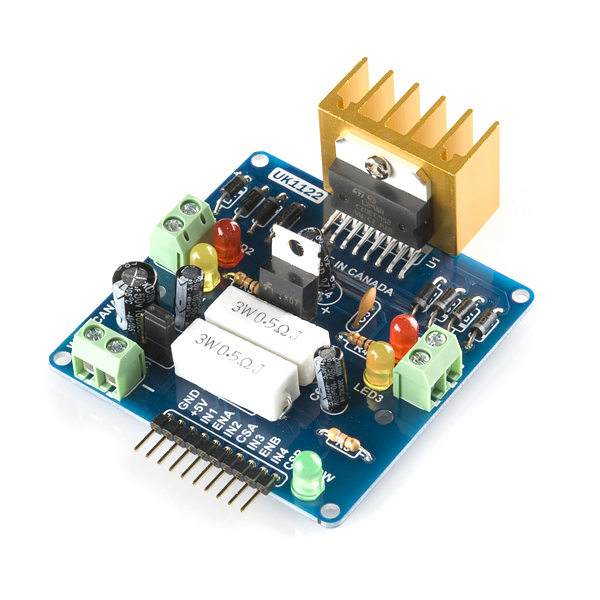|
upm
0.8.0
Sensor/Actuator repository for libmraa (v1.1.1)
|
|
upm
0.8.0
Sensor/Actuator repository for libmraa (v1.1.1)
|
API for the L298 Dual H-Bridge Motor Driver. More...
It was developed using the RobotBase Dual H-Bridge module.
This module can support 2 DC motors, or one 2-phase stepper motor. It requires 3 pins per DC motor (or H-bridge), or 4 pins for the stepper motor (uses both H-bridges).

L298 Dual H-Bridge Motor Driver image provided by SparkFun* under CC BY-NC-SA-3.0.
Example driving a DC motor
Example driving a stepper motor
Public Types | |
| enum | L298_DIRECTION_T { DIR_NONE = 0x00, DIR_CW = 0x01, DIR_CCW = 0x02 } |
Public Member Functions | |
| L298 (int pwm, int dir1, int dir2) | |
| L298 (int stepsPerRev, int en, int i1, int i2, int i3, int i4) | |
| ~L298 () | |
| uint32_t | getMillis () |
| void | initClock () |
| void | setPeriodMS (int ms) |
| void | enable (bool enable) |
| void | setSpeed (int speed) |
| void | setDirection (L298_DIRECTION_T dir) |
| void | stepperSteps (unsigned int steps) |
| enum L298_DIRECTION_T |
Enum to specify the direction of a motor
| L298 | ( | int | pwm, |
| int | dir1, | ||
| int | dir2 | ||
| ) |
L298 constructor for DC motor(s) connected.
| pwm | Digital pin to use for a DC motor - must be PWM-capable |
| dir1 | Digital pin to use for motor direction pin 1 |
| dir2 | Digital pin to use for motor direction pin 2 |
| L298 | ( | int | stepsPerRev, |
| int | en, | ||
| int | i1, | ||
| int | i2, | ||
| int | i3, | ||
| int | i4 | ||
| ) |
L298 constructor for a 4-wire stepper motor
| stepsPerRev | Number of steps per full revolution |
| en | Enables the pin |
| i1 | Digital pin to use for stepper input 1 |
| i2 | Digital pin to use for stepper input 2 |
| i3 | Digital pin to use for stepper input 3 |
| i4 | Digital pin to use for stepper input 4 |
| uint32_t getMillis | ( | ) |
Returns the number of milliseconds elapsed since initClock() was last called.
| void initClock | ( | ) |
Resets the clock
| void setPeriodMS | ( | int | ms | ) |
Sets the period in milliseconds
| ms | Period in milliseconds |
| void enable | ( | bool | enable | ) |
Enables the PWM output for a motor
| enable | Enables the PWM output if true, disables if false |
| void setSpeed | ( | int | speed | ) |
Sets the speed of a DC or stepper motor. For a DC motor, values can range from 0 (off) to 100 (full speed). For a stepper motor, specify the desired RPM.
| speed | Speed to set the motor to |
| void setDirection | ( | L298_DIRECTION_T | dir | ) |
Sets the direction of the motor, clockwise or counterclockwise
| dir | Direction to set the motor to |
| void stepperSteps | ( | unsigned int | steps | ) |
Steps the stepper motor a specified number of steps
| steps | Number of steps to move the stepper motor |
 1.8.6
1.8.6